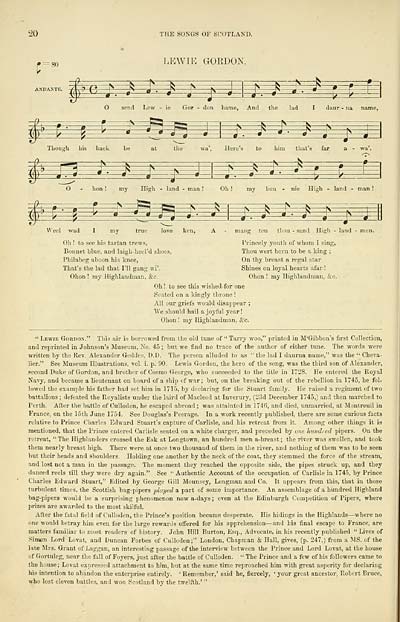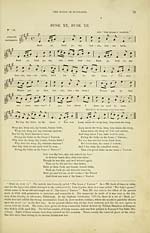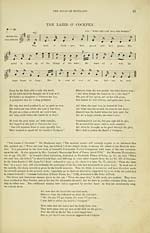Glen Collection of printed music > Printed music > Wood's edition of the songs of Scotland
(44) Page 20 - Lewie Gordon
Download files
Complete book:
Individual page:
Thumbnail gallery: Grid view | List view

20
THE SONGS 01" SCOTLAND.
f ^80
k
LEWIE GOKDON.
&
send Lew - ie Gor - don liame, And the
lad
daur - na name,
^=^:
*= jL_gO E
f=^
*zri:
Though his back
he
the
Here's
$
m&
him that's far
£
hon ! my High - land - man ! Oh ! my bon - nie High - land - man !
^=^
m
Weel wad
I
my
true love ken,
Oh ! to see his tartan trews,
Bonnet blue, and laigh-heel'd shoes,
Philabeg aboon his kuee,
That's the lad that I'll gang wi'.
Ohon ! my Highlandman, &c.
lang ten thou - sand High - land - men.
Princely youth of whom I sing,
Thou wert born to be a king ;
On thy breast a regal star
Shines on loyal hearts afar !
Ohon ! my Highlandman, &c.
Oh ! to see this wished-for one
Seated on a kingly throne !
All our griefs would disappear ;
We should hail a joyful year!
Ohon ! my Highlandman, &c.
" Lewie Gordon." This air is borrowed from the old tune of " Tarry woo," printed in M'Gibbon's first Collection,
and reprinted in Johnson's Museum, No. 45 ; but we find no trace of the author of either tune. The words were
written by the Rev. Alexander Geddes, D.D. The person alluded to as " the lad I daurna name," was the " Cheva-
lier." See Museum Illustrations, vol. i. p. 90. Lewis Gordon, the hero of the song, was the third son of Alexander,
second Duke of Gordon, and brother of Cosmo George, who succeeded to the title in 1728. He entered the Royal
Navy, and became a lieutenant on board of a ship of war; but, on the breaking out of the rebellion in 1745, he fol-
lowed the example his father had set him in 1715, by declaring for the Stuart family. He raised a regiment of two
battalions ; defeated the Royalists under the laird of Macleod at Inverury, (23d December 1745,) and then marched to
Perth. After the battle of Culloden, he escaped abroad ; was attainted in 1746, and died, unmarried, at Montreuil in
France, on the 15th June 1754. See Douglas's Peerage. In a work recently published, there are some curious facts
relative to Prince Charles Edward Stuart's capture of Carlisle, and his retreat from it. Among other things it is
mentioned, that the Prince entered Carlisle seated on a white charger, and preceded by one hundred pipers. On the
retreat, " The Highlanders crossed the Esk at Longtown, an hundred men a-breast ; the river was swollen, and took
them nearly breast high. There were at once two thousand of them in the river, and nothing of them was to be seen
but their heads and shoulders. Holding one another by the neck of the coat, they stemmed the force of the stream,
and lost not a man in the passage. The moment they reached the opposite side, the pipes struck up, and they
danced reels till they were dry again." See " Authentic Account of the occupation of Carlisle in 1745, by Prince
Charles Edward Stuart," Edited by George Gill Mounsey, Longman and Co. It appears from this, that in those
turbulent times, the Scottish bag-pipers played a part of some importance. An assemblage of a hundred Highland
bag-pipers would be a surprising phenomenon now a-days ; even at the Edinburgh Competition of Pipers, where
prizes are awarded to the most skilful.
After the fatal field of Culloden, the Prince's position became desperate. His hidings in the Highlands — where no
one would betray him even for the large rewards offered for his apprehension — and his final escape to France, are
matters familiar to most readers of history. John Hill Burton, Esq., Advocate, in his recently published " Lives of
Simon Lord Lovat, and Duncan Forbes of Culloden;" London, Chapman & Hall, gives, (p. 247,) from a MS. of the
late Mrs. Grant of Laggan, an interesting passage of the interview between the Prince and Lord Lovat, at the house
of Gortuleg, near the fall of Foyers, just after the battle of Culloden. " The Prince and a few of his followers came to
the house ; Lovat expressed attachment to him, but at the same time reproached him with great asperity for declaring
his intention to abandon the enterprise entirely. ' Remember,' said he, fiercely, ' your great ancestor, Robert Bruce,
who lost eleven battles, and won Scotland by the twelfth.' "
THE SONGS 01" SCOTLAND.
f ^80
k
LEWIE GOKDON.
&
send Lew - ie Gor - don liame, And the
lad
daur - na name,
^=^:
*= jL_gO E
f=^
*zri:
Though his back
he
the
Here's
$
m&
him that's far
£
hon ! my High - land - man ! Oh ! my bon - nie High - land - man !
^=^
m
Weel wad
I
my
true love ken,
Oh ! to see his tartan trews,
Bonnet blue, and laigh-heel'd shoes,
Philabeg aboon his kuee,
That's the lad that I'll gang wi'.
Ohon ! my Highlandman, &c.
lang ten thou - sand High - land - men.
Princely youth of whom I sing,
Thou wert born to be a king ;
On thy breast a regal star
Shines on loyal hearts afar !
Ohon ! my Highlandman, &c.
Oh ! to see this wished-for one
Seated on a kingly throne !
All our griefs would disappear ;
We should hail a joyful year!
Ohon ! my Highlandman, &c.
" Lewie Gordon." This air is borrowed from the old tune of " Tarry woo," printed in M'Gibbon's first Collection,
and reprinted in Johnson's Museum, No. 45 ; but we find no trace of the author of either tune. The words were
written by the Rev. Alexander Geddes, D.D. The person alluded to as " the lad I daurna name," was the " Cheva-
lier." See Museum Illustrations, vol. i. p. 90. Lewis Gordon, the hero of the song, was the third son of Alexander,
second Duke of Gordon, and brother of Cosmo George, who succeeded to the title in 1728. He entered the Royal
Navy, and became a lieutenant on board of a ship of war; but, on the breaking out of the rebellion in 1745, he fol-
lowed the example his father had set him in 1715, by declaring for the Stuart family. He raised a regiment of two
battalions ; defeated the Royalists under the laird of Macleod at Inverury, (23d December 1745,) and then marched to
Perth. After the battle of Culloden, he escaped abroad ; was attainted in 1746, and died, unmarried, at Montreuil in
France, on the 15th June 1754. See Douglas's Peerage. In a work recently published, there are some curious facts
relative to Prince Charles Edward Stuart's capture of Carlisle, and his retreat from it. Among other things it is
mentioned, that the Prince entered Carlisle seated on a white charger, and preceded by one hundred pipers. On the
retreat, " The Highlanders crossed the Esk at Longtown, an hundred men a-breast ; the river was swollen, and took
them nearly breast high. There were at once two thousand of them in the river, and nothing of them was to be seen
but their heads and shoulders. Holding one another by the neck of the coat, they stemmed the force of the stream,
and lost not a man in the passage. The moment they reached the opposite side, the pipes struck up, and they
danced reels till they were dry again." See " Authentic Account of the occupation of Carlisle in 1745, by Prince
Charles Edward Stuart," Edited by George Gill Mounsey, Longman and Co. It appears from this, that in those
turbulent times, the Scottish bag-pipers played a part of some importance. An assemblage of a hundred Highland
bag-pipers would be a surprising phenomenon now a-days ; even at the Edinburgh Competition of Pipers, where
prizes are awarded to the most skilful.
After the fatal field of Culloden, the Prince's position became desperate. His hidings in the Highlands — where no
one would betray him even for the large rewards offered for his apprehension — and his final escape to France, are
matters familiar to most readers of history. John Hill Burton, Esq., Advocate, in his recently published " Lives of
Simon Lord Lovat, and Duncan Forbes of Culloden;" London, Chapman & Hall, gives, (p. 247,) from a MS. of the
late Mrs. Grant of Laggan, an interesting passage of the interview between the Prince and Lord Lovat, at the house
of Gortuleg, near the fall of Foyers, just after the battle of Culloden. " The Prince and a few of his followers came to
the house ; Lovat expressed attachment to him, but at the same time reproached him with great asperity for declaring
his intention to abandon the enterprise entirely. ' Remember,' said he, fiercely, ' your great ancestor, Robert Bruce,
who lost eleven battles, and won Scotland by the twelfth.' "
Set display mode to: Large image | Transcription
Images and transcriptions on this page, including medium image downloads, may be used under the Creative Commons Attribution 4.0 International Licence unless otherwise stated. ![]()
| Special collections of printed music > Glen Collection of printed music > Printed music > Wood's edition of the songs of Scotland > (44) Page 20 - Lewie Gordon |
|---|
| Permanent URL | https://digital.nls.uk/91338271 |
|---|
| Description | Scottish songs and music of the 18th and early 19th centuries, including music for the Highland bagpipe. These are selected items from the collection of John Glen (1833 to 1904). Also includes a few manuscripts, some treatises, and other books on the subject. |
|---|
| Description | The Glen Collection and the Inglis Collection represent mainly 18th and 19th century Scottish music, including Scottish songs. The collections of Berlioz and Verdi collected by bibliographer Cecil Hopkinson contain contemporary and later editions of the works of the two composers Berlioz and Verdi. |
|---|

